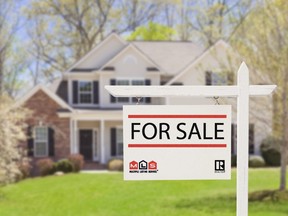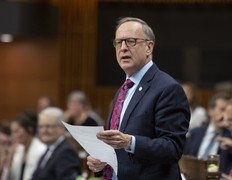
Article content
A few weeks back, I went out on a limb and said that all signs were pointing to the fact the real estate market was waking up again.
Advertisements 2
Article content
I spoke of houses selling in multiple offers a day or two after going to market. Colleagues around the water cooler who were telling me of clients coming back out of the wind, ready to think about real estate again.
Article content
Buyers were showing a willingness to come in off the sidelines, I said. Could it be that they think the worst is now over?
Well, it turns out that the theory of mine wasn’t just born of “hopium” — incidentally, my new, most favorite word to come out of the past few months of real estate downtime.
No, no. Hopium be damned — the real estate market is alive again.
By Wednesday of last week — the first days post-March break, which is unofficially the start of the spring market — I personally witnessed four midtown houses go within hours of being listed.
Article content
Advertisements 3
Article content
What might we glean from that?
Could it be that people are feeling optimistic?
-

LACKIE: Where are all of the sales power?
-

LACKIE: BoC pause brings relief but nothing close to consensus
-

LACKIE: February market stats have much to tell
Clearly consumer sentiment has improved. Though if a year ago someone had told me there could be excitement at seeing creep rates just below 5%, I would have told them to give their heads a shake.
But those rates have clearly started to normalize.
Assisted by the fact that markets are evidently now considering the banking meltdown south of the border may serve to bring about the great pivot sooner than late-2024 as consensus had previously thought.
Even the permabears seem to acknowledge we are witnessing a rally of sorts.
Advertisements 4
Article content
And while it’s hard to know why, the reality is that life will always go on. The three D’s of real estate — death, divorce and debt — are immune to consumer sentiment. And with record lows in transaction volume, there is without a doubt pent up demand waiting to greet spring.
But this appears to be more than that. This seems to also relate to a belief that the worst is now over and while it has certainly been bumpy, better days lie ahead.
But why is that?
RECOMMENDED VIDEOS
I often hear people say Canada is way too dependent upon our housing market to ever let it fail. Of all the G7 nations, Canada is the most indebted with Canadians taking on far more household debt than our G7 peers.
It seems the takeaway from that should-be sobering reality has done less to inspire people to reconsider their comfort levels with debt and more to reaffirm their entrenched belief that it’s probably safe to keep going as we are too big to fail.
Advertisements 5
Article content
The notion of moral hazard comes to mind. Simply put, it’s the idea that one is less likely to guard against financial risk if one believes they are to be protected from potential consequences.
Here we have spent the last year weathering the storm of a real estate bubble bursting and while it has certainly been unpleasant, even painful, most people seem to be okay.
They may now have 80-year amortizations on their mortgage with payments barely covering a dime of principal, but they’re still standing and this too shall pass.
RECOMMENDED VIDEOS
But really, does anyone born after 1980 actually believe they’ll ever be mortgage free? Or are we the generation that was forced to rethink our understanding of home ownership from one of pay-it-down-as-fast-as-possible to that of find-a-payment-that-works as you build enough equity to ascend to the next rung. And repeat.
Advertisements 6
Article content
For many, the fact they are in the market at all feels like a penultimate win given the number of surveys that show the extent to which more recent generations feel shut out of the market entirely. Being mortgage free must seem like pure Boomer fantasy; we should just be happy not to have to live as renters at the mercy of financialized real estate.
And, of course, the fact that it took so long for the Bank of Canada to step in and raise interest rates in the midst of a rapidly inflating housing bubble has led to questions about how insulated it can really be from wider political pressures.
With that in mind, it’s hard not to think that influence is now baked in. Will our government really allow the housing market to collapse?
Seems many believe not. And honestly who could blame them.






Comments
Postmedia is committed to maintaining a lively but civil forum for discussion and encourages all readers to share their views on our articles. Comments may take up to an hour for moderation before appearing on the site. We ask you to keep your comments relevant and respectful. We have enabled email notifications—you will now receive an email if you receive a reply to your comment, there is an update to a comment thread you follow or if a user you follow comments. Visit our Community Guidelines for more information and details on how to adjust your email settings.
Join the Conversation